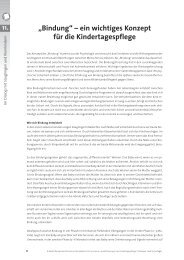download - Deutsches Jugendinstitut e.V.
download - Deutsches Jugendinstitut e.V.
download - Deutsches Jugendinstitut e.V.
You also want an ePaper? Increase the reach of your titles
YUMPU automatically turns print PDFs into web optimized ePapers that Google loves.
Recommendations for action<br />
1. The discussion revealed that the instrument “Small Grants” has been a success in<br />
all three countries and will definitely be continued.<br />
2. At the beginning of the new ESF subsidy period, the EU Commission has<br />
continued to recommend the payment of 100 % grants, but a 100 % funding on a<br />
national level cannot be guaranteed. What is certain is that a co-financing obligation<br />
on a micro-project level is not practicable, but would have to be realised on another<br />
higher level. In England for example, co-financing is provided among others by job<br />
agencies. An advantage of co-financing is the involvement of new partners, but the<br />
disadvantage here is the dependency on the financial backers. For this reason, the<br />
retention of 100 % funding would be preferable! If co-financing is necessary, it<br />
should only be provided on a programme (i.e. national) level.<br />
3. Both socio-environmental and addressee-based approaches have proved to be<br />
successful; the combination of the two approaches would be particularly promising.<br />
4. The advantage of programme coordination through an NGO is the better<br />
accessibility of target groups, provided that the relevant NGO has sufficient<br />
experience within this field (this is for example the case in Italy, where cooperatives<br />
are particularly supported: social consortia which have provided consultancy<br />
services for cooperatives for over 30 years function as coordinators). The advantage<br />
of coordination undertaken by local authorities is the assumption of responsibility<br />
and the improved coordination of the various strategies, excluding the possibility of<br />
redundant funding. In an addressee-based approach, it would be advantageous if<br />
the NGO undertook the coordination but in close cooperation with regional<br />
authorities – this will however only function if the decision-making power is in the<br />
hands of a committee in which civil society actors are explicitly represented.<br />
5. Finally, we would like to underline that due to the preparatory measures undertaken<br />
within the employment field, target groups not previously accessed were able to<br />
participate in these projects. An overemphasis on the employment market does<br />
however risk the exclusion of especially disadvantaged persons. The aim of support<br />
must be to stabilise these particularly disadvantaged persons and pave their way<br />
towards the employment market. In a second step, a more direct approach towards<br />
employment can be targeted on the basis of these preparatory measures.<br />
In Germany, there were several examples in which a qualification gained led to the<br />
establishment of a new business.<br />
85

















